Posts Tagged ‘Entrepreneurship’
115 Heidi Roizen Silicon Valley Legend
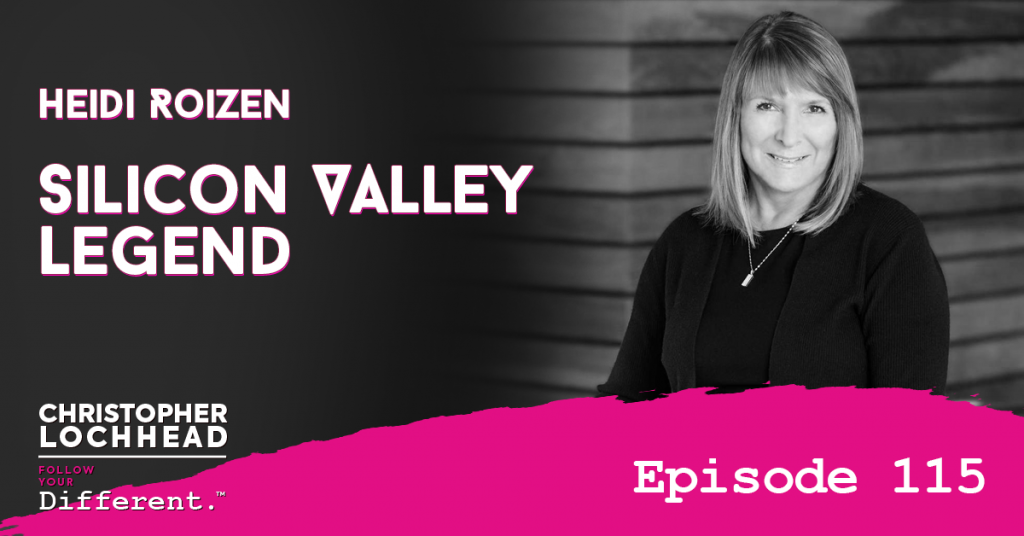
Podcast: Play in new window | Download (Duration: 1:06:50 — 93.1MB) | Embed
Subscribe: Apple Podcasts | Spotify | Pandora | RSS | More
Today’s guest is none other than Silicon Valley Legend, Heidi Roizen. She is an accomplished, Entrepreneur, former head of developer relations at Apple and now, a legendary VC. She shares with us why today is the Golden Era for entrepreneurship, how any company is literally a tech company and more about VC-backed company, Memphis Meats.
Silicon Valley’s Greatest Connector
The Financial Women of San Francisco honored Heidi as Financial Woman of the Year in 2018. She is also dubbed as “Silicon Valley’s Greatest Connector.” She is currently sits on the board of companies such as Zoox, Planet, Memphis Meats, HelixRE and DMGT.
“I talk about the fact that there should be more women entrepreneurs and there should be more women venture capitalists and diversity. Not just gender diversity but other diversity and I try to support that through my actions. I think it’s appropriate given my role in Silicon Valley. If I have an opinion about that, I should be vocal about that.” – Heidi Roizen
Other than these achievements, Heidi is a self-proclaimed animal lover. She adopted several dogs from the shelter, which she fondly shares in her social media.
Golden Era of Entrepreneurship
Heidi describes the market as a seller’s market when it comes to early-stage equity. There are a lot of sources of capital in the market, its very competitive. She enumerates all the positive assets entrepreneurs have in today’s world.
“There’s just so many different avenues for funding. There are so many tech breakthroughs that can be built upon, whether that is networking or processing power, sensors, devices, GPS, next-gen VR technologies, ubiquitous platforms. When you think about the kinds of businesses you can start today for pennies, which costs hundreds of thousands of dollars in the past.” – Heidi Roizen
The only negative she can mention is about competition, as she believes everyone else can also solve many big, interesting problems. Additionally, she mentions why companies nowadays are considered tech companies.
“I do think it’s interesting today is, every company is a technology company, right? For the most part, how they interact with the customers, how they distribute their products, how they garner feedback, how they handle customer service, tech support, logistics, supply chain, internally, HR systems—every company is deep in technology now.” – Heidi Roizen
Memphis Meats. Cell-based Meat
Heidi shares more about Memphis Meats and why she believes there is a huge growth potential for cell-based meat. First, she discusses how meat is inefficient to produce: from breeding to feeding to slaughtering and distribution to markets. Not only does it requires more resources, such as land and water use, it is also highly prone to contamination.
“The great thing about being a venture capitalist is, we don’t have to actually invent this stuff. There are really awesome entrepreneurs that are way smarter than we are who come up with these ideas. We just have to make sure they want to come to talk to us, and that we can validate sufficiently what they are doing through our own research learning.” – Heidi Roizen
To hear more about legendary Silicon Valley stories of Heidi Roizen, download and listen to the episode.
Bio:
Heidi represents the voice of the entrepreneur, having been one herself.
But she also represents the voice of the user, as those are the roots that led her to start a company in the first place.
She is on the boards of directors of Zoox, Planet, Memphis Meats, HelixRE and DMGT (LSE:DMGT.)
After Heidi earned her undergraduate and MBA degrees from Stanford, she co-founded T/Maker, where she served as CEO for over a decade through its acquisition by Deluxe Corporate in 1994. Next, she joined Apple as VP of Worldwide Developer Relations, and from there, Mobius Venture Capital.
She’s been named to the Corporate Board Member’s “Top 50 Women in Tech” list and Hot Topics’ Top 100 Women in Tech.
In 2018, Heidi was named the Financial Woman of the Year by the Financial Women of San Francisco.
She has also earned the Forum for Women Entrepreneurs and Executives Annual Achievement Award, among other accolades.
Heidi currently holds two leadership positions at Stanford University.
She co-leads the Threshold Venture Fellows in the Management Science and Engineering department at Stanford. She is also a member of the advisory council of Stanford’s Institute for Human-Centered Artificial Intelligence.
Links:
Silicon Valley’s Greatest Connector
Financial Women of San Francisco Name Heidi Roizen 2018 Financial Woman of the Year
We hope you enjoyed this episode of Follow Your Different™! Christopher loves hearing from his listeners. Feel free to email him, connect on Facebook, Twitter, Instagram and subscribe on iTunes! Get amazing, different stories on business, marketing, and life. Subscribe to our newsletter The Difference.
114 Think Like Amazon w/ John Rossman
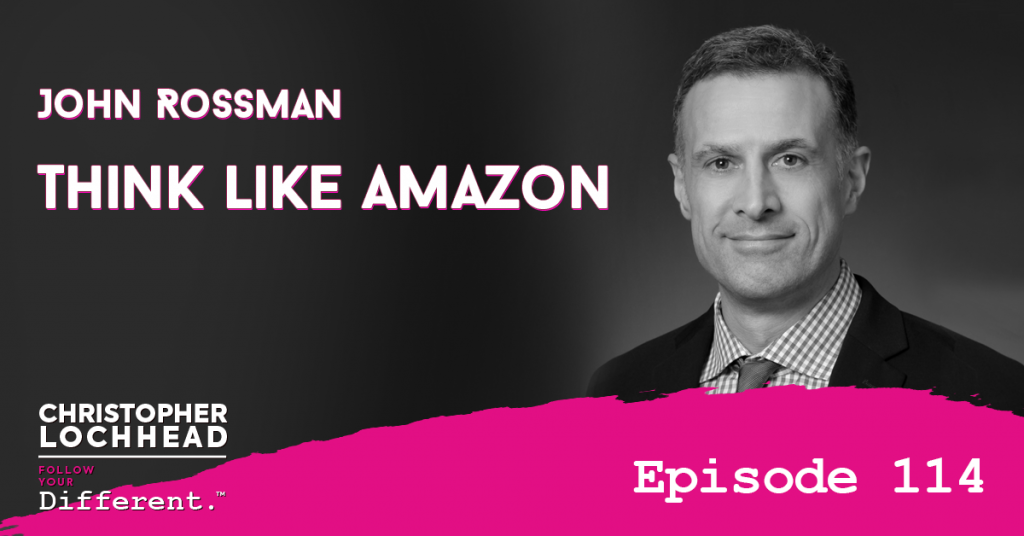
Podcast: Play in new window | Download (Duration: 56:44 — 78.2MB) | Embed
Subscribe: Apple Podcasts | Spotify | Pandora | RSS | More
For the second part of our two-part series on legendary category king companies, we are featuring John Rossman, author of “Think Like Amazon.”
We have a fun, insightful conversation about how Amazon became arguably the most innovative category king in the world and most importantly, how you can learn to think like Amazon in your career.
Digital vs. Traditional
Christopher probes John on his thoughts about the distinction between traditional businesses versus data-driven, digital ones. John shares that other than the technological aspect, he could relate digital businesses to athletic attributes such as speed and agility.
In detail, John said speed is about doing a repetitive motion, extremely well and efficiently. In business terms, that is considered as operational excellence. The second attribute, agility, is the ability to sense and make change happen.
“Part of being digital is about the eternal pursuit of becoming perfect. How do we reduce cycle times? Improve quality, reduce costs? Cut out little pieces of friction from both our customers and employees?” – John Rossman
Embracing New Niches
John cites Amazon’s business strategy in terms of embracing new niches. The other aspect of finding problems, then working on a solution, is the notion of working into the future. He defines the future as a “time and a place for unconstrained thinking.”
“Amazon’s answer to that, their philosophy or their technique is: start with the customer and work backward. ” – John Rossman
When teams are brainstorming, all of these constraints come to the table and they deliberately understand which parts of the solution they are. Afterward, they identify the right mindset, then the right tools and ultimately, the right approach in order to solve the problem.
Architecture is the Business Strategy
Citing some parts of the book, Think Like Amazon, Christopher asks John the idea behind the concept architecture is the business strategy.
“You have to plan forward on how you build things, because the constraints, the flexibility the adaptability on how you build your operations and your technology architecture—will either be a key enabler or key constraint in your ability in going forward.” – John Rossman
In the end, John shares that his whole goal is to give a business person, who is not technology architect, a set of tools and questions that they utilize to be a better partner with their technology expert
To hear more about how digital businesses like Amazon innovate across entire the entire value-chain and John Rossman’s thoughts on how to make wise bets on new business ideas, download and listen to the episode.
Bio:
John Rossman, Digital and Innovation Advisor
Mr. Rossman is an expert at digital business models, operations and organizing programs. He has led engagements on developing innovation processes, Internet of Things strategies, marketplace and API driven platform business models.
He is a sought after speaker on creating a culture of operational excellence and innovation.
Mr. Rossman has worked with clients across various industries, including retail, insurance, education, healthcare, consumer products, industrial products and transportation.
Mr. Rossman’s notable assignments include The Bill and Melinda Gates Foundation, Microsoft, Nordstrom and several of the world’s leading retail and insurance organizations.
Prior to Rossman Partners, John was a Managing Director at Alvarez and Marsal, a performance improvement consulting firm.
Prior to A&M, John was an executive at Amazon.com where he launched the Marketplace business and third party selling platform, and ran the merchant services business.
Links:
We hope you enjoyed this episode of Follow Your Different™! Christopher loves hearing from his listeners. Feel free to email him, connect on Facebook, Twitter, Instagram and subscribe on iTunes! Get amazing, different stories on business, marketing, and life. Subscribe to our newsletter The Difference.
113 Netflix’s Founding CEO Marc Randolph
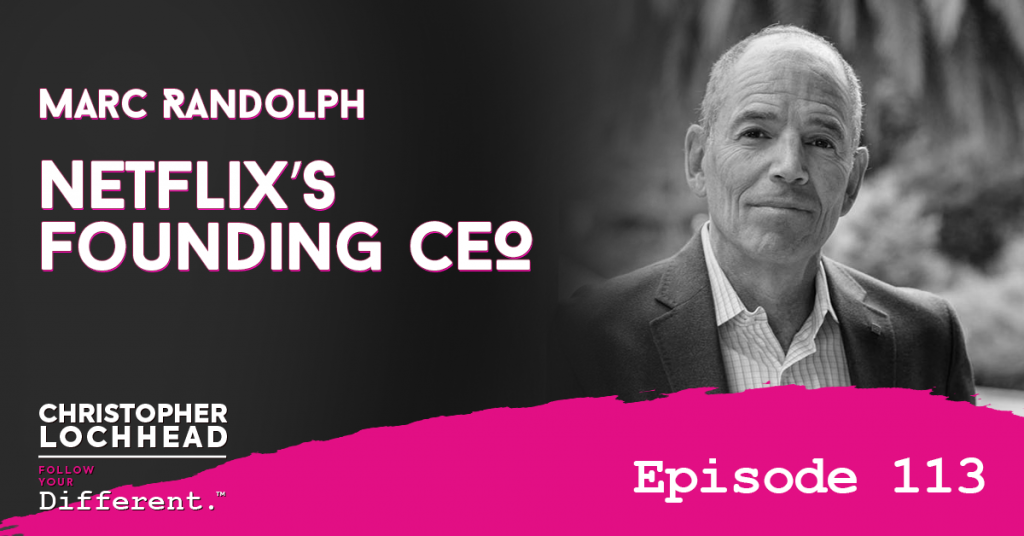
Podcast: Play in new window | Download (Duration: 59:52 — 55.1MB) | Embed
Subscribe: Apple Podcasts | Spotify | Pandora | RSS | More
Category King Marc Randolph, the founding CEO of Netflix, joins us today for a stunning conversation about business and life. He’s got a legendary bestseller out called That Will NEVER Work: The Birth of Netflix and the Amazing Life of an Idea, which he also talks about in this episode.
This is the first in a special two-part series about two of the most legendary category king companies in the world now Netflix and Amazon. Next episode is with John Rossman, author of “Think Like Amazon.”
Book: That Will Never Work
After nearly 16 years after he left Netflix, Marc Randolph talks about his book That Will Never Work. He candidly shares that all those years waiting for the right time to write a book helped him to gain perspective.
First, he says he is wiser business-wise as he worked with a lot of startup companies in the past 16 years. He says he can now identify patterns as they emerge and can safely say he can tell between what works and will not.
“The other cool thing that came out of waiting was, being able to look back and be honest about myself. To really say, ‘I don’t care how it’s perceived. I want this to be a real true portrayal of what it’s like in a startup.’” – Marc Randolph
Remembering Moments, Not Details
Marc also shares that he tried to get it right, but since he is writing about events that took place around 20 years ago, he shares how ridiculous it would be to remember every line and dialogue that he featured in the book.
He also shares he focused on remembering the moments, especially the mood of the conversations that he had. Christopher even remarked a portion of the book where Marc wrote: “This is a memoir, not a documentary. This is kind of how I remember things. I’m not trying to get it 100% right.”
Everything is Intermingled
Christopher chides with Marc on the part where he mentions that personal life intermingles with business life. Marc stressed the importance of devoting time for spouses and kids, as this is a realistic portrayal of a startup.
“I think part of being successful is having balance in your life. I preach about culture is not about what you say, it’s what you do. So I wanted to show how we did it, how do you really have balance in your life.” – Marc Randolph
To hear more about life and business lessons from Netflix Founding CEO Marc Randolph, download and listen to the episode.
Bio:
Marc Randolph is a veteran Silicon Valley entrepreneur, advisor, and investor. As co-founder and founding CEO of Netflix, he laid much of the groundwork for a service that’s grown to 150 million subscribers and fundamentally altered how the world experiences media.
He also served on the Netflix board of directors until retiring from the company in 2003.
Marc’s career as an entrepreneur spans four decades.
He’s founded or co-founded six other successful startups, mentored hundreds of early-stage entrepreneurs, and as an investor has helped seed dozens of successful tech ventures (and just as many unsuccessful ones).
Most recently, he co-founded analytics software company Looker Data Sciences, which was recently purchased by Google for $2.6 billion.
Outside of the tech and startup world, Marc sits on the boards of Chubbies Shorts, Augment Technologies, the environmental advocacy group 1% For The Planet, and the National Outdoor Leadership School (NOLS), which he’s been involved with for most of his life.
A resident of Santa Cruz, California, Marc travels and speaks all over the world, and still probably manages to go surfing more than you do.
Links:
We hope you enjoyed this episode of Follow Your Different™! Christopher loves hearing from his listeners. Feel free to email him, connect on Facebook, Twitter, Instagram and subscribe on iTunes! Get amazing, different stories on business, marketing, and life. Subscribe to our newsletter The Difference.
111 Mia Khalifa Digital Media Super Star
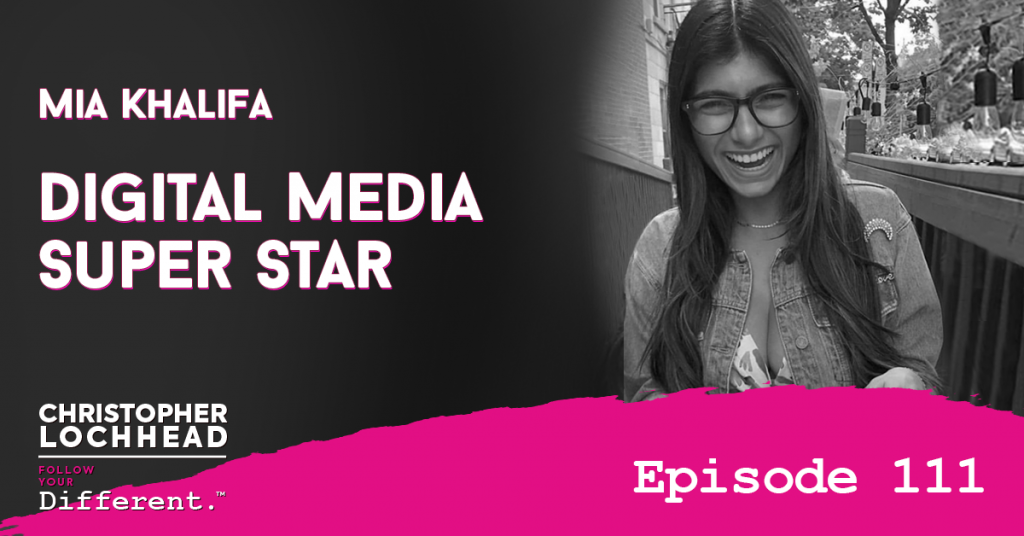
Podcast: Play in new window | Download (Duration: 1:21:13 — 74.7MB) | Embed
Subscribe: Apple Podcasts | Spotify | Pandora | RSS | More
Former adult actor and now digital media star, Mia Khalifa, joins us today for another riveting conversation. She walked away at the peak of her popularity to design a new life and career. She shares with us today about her past and how low self-esteem affected her decisions and how she’s moving forward with her life.
Sports, Punk Rock, and Pets
Mia Khalifa is a sports commentator, with a special love for The Washington Capitals Hockey team. Other than hockey, she used to watch basketball a lot when she was a young immigrant from Lebanon.
“It’s kind of just been a common ground that I could have with people and a way for me to connect, a way for me to feel like I am part of something or feel like I’m a part of this group even if I don’t know anyone. Sports is the unifying factor in this world.” – Mia Khalifa
Other than being a huge sports fan, she is a self-proclaimed foodie and she loves punk rock. She also shares in this episode how she loves her pet dogs so much and how she is trying her best to be the person her dogs think she is: a better human being.
Battling Low Self-Esteem
Mia is also a digital celebrity, raking a total of 17.7 million followers on Instagram alone. In fact, she met her fiance on Instagram. Her fiance is a Swedish Chef, whom she candidly shares, as someone who doesn’t know who she is.
She has never gotten used to fame as she shares how she battled low self-esteem when she was younger. She admits that due to low self-confidence, she made decisions that she regret at the present time.
“I think it was being overweight for such a large part of my life and on top of that, I didn’t really have many friends in highschool. I never fit in in any certain group or the popular crowd or anything. I think it also had a lot to do with never feeling like I belong.” – Mia Khalifa
The Ugly Side of Adult Entertainment
Most of her followers had known her from her previous career as an adult entertainment actor. In fact, she used to be #1 in the biggest Adult sites in the world. She started her adult film career when she was just 21 years old.
What most people do not know is her career only lasted 3 months. She shot about twelve scenes, where produces paid her only $12,000. Adult actors do not receive any kind of royalty, while producers amass millions.
“I was fooled into thinking they had my best interest at heart, when in reality, they were just looking out for themselves. They looked at me and saw a huge paycheck.” – Mia Khalifa on Adult Entertainment Producers
To hear more about #1 Adult Actor to Digital Media Star Mia Khalifa, download and listen to the episode.
Bio:
Mia Khalifa is a social media personality, sports commentator and former adult film actor.
She’s a passionate Washington, D.C. sports fan with a love for the Washington Capitals hockey team.
Links:
Mia Khalifa is among the world’s most-watched women. Yet the porn industry is keeping the profits.
Mia Khalifa: Why I’m speaking out about the porn industry – BBC News
We hope you enjoyed this episode of Follow Your Different™! Christopher loves hearing from his listeners. Feel free to email him, connect on Facebook, Twitter, Instagram and subscribe on iTunes! Get amazing, different stories on business, marketing, and life. Subscribe to our newsletter The Difference.
108 Top 1% of Enterprise Technology Investors Bruce Cleveland
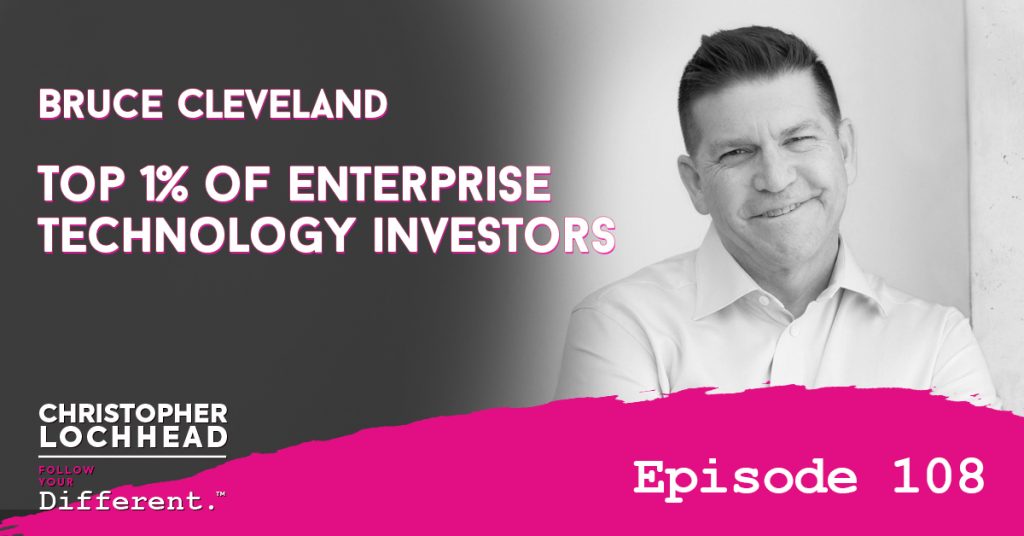
Podcast: Play in new window | Download (Duration: 1:00:16 — 55.5MB) | Embed
Subscribe: Apple Podcasts | Spotify | Pandora | RSS | More
As we continue our run on legendary VCs, we feature today Bruce Cleveland, an entrepreneur, executive, venture capital investor and best selling author of Traversing the Traction Gap. We have a fun and insightful conversation today about the state of enterprise tech and why its the best place to create enduring value. We also touch important points on digital transformation and a lot more!
Legendary VCs
Joining our list of legendary VCs that we have featured on Follow Your Different is Bruce Cleveland. He joins Randy Komisar (Episode 106) and Heidi Roizen (upcoming episode). He is the founding partner of Wildcat Ventures which has been rated in the top 1% of enterprise technology investors on the planet.
At the moment, he is taking up his Masters Degree at John Hopkins University, America’s first research university. He took up Digital Communication, which he feels would be beneficial for writing content for his succeeding books.
Enterprise Tech Scene
Bruce shares a number of important insights into the enterprise tech scene. Furthermore, he shares that the valuations of companies of public SAS companies or tech companies selling into enterprise using a subscription model are reflective of the enduring value.
Additionally, he cites examples of consumer companies that require a tremendous amount of capital, as opposed to enterprise companies, which require much less.
“Consumers require so much capital, not a fund to build a product but to build the market share.” – Bruce Cleveland
Enterprise vs. Consumer Company
Bruce shares what investors are looking for enterprise and consumer companies. The MOIC or The Multiple On Investment Capital is nominally better in an enterprise. However, he mentions that the issue is these enterprise companies take longer to build up.
“You don’t get those big mark up in the first 2 years, as the company began to scale and show minimum viable traction. The important part here is a lot of limited partners, people who invest in venture firms. They want to see early mark up in your funds.” – Bruce Cleveland
These investors want to see great markups to show the committee that the firm is of great financial health. However, they don’t inform the committee how much money they need to get the company “out of the door.”
“They are extraordinarily capital intensive, and the multiple uninvested capitals are high. A lot of these things are faddish. They may work initially, I don’t know, they can move in other areas. Then they’ll be okay, but a lot of times, these things can come and go.” – Bruce Cleveland
To hear more about the Top 1% of Enterprise Technology Investor Bruce Cleveland, download and listen to the episode.
Bio:
Bruce Cleveland is a Founding Partner at Wildcat. He focuses on investments in AI marketing, EdTech, enterprise software as a service (SaaS) and the Internet of Things (IoT).
He’s also the author of Traversing the Traction Gap.
His specific areas of interest include enterprise automation, education and training, and general business applications. Bruce likes working with early-stage companies that use technology and data to increase revenue and decrease costs.
An avid adventurer and sailor, Bruce enjoy the challenge of creating new companies and navigating new markets.
He is interested in growing entrepreneurial hubs outside of Silicon Valley, with a particular focus on the Pacific Northwest.
Bruce also is committed to sharing his knowledge and experience through the Traction Gap Framework™. This aims to help entrepreneurs navigate the critical go-to-market period between initial product release (IPR) and reaching minimal viable traction (MVT).
As a son of school teachers, Bruce supports continued education.
He founded GreenFig to offer applied business science training to higher-ed students and individuals in job transition.
Bruce held senior executive roles in engineering, product management and product marketing. He worked with companies, such as Apple, AT&T, Oracle, and Siebel Systems.
In this role, Forbes and IDC credited him with creating the most effective B2B alliance program in the software industry.
Bruce began his venture capital career at InterWest Partners, where he was the first investor and a former board member of Marketo. The company held an IPO in 2013 and was acquired by Vista Equity Partners in 2016 for $1.8 billion.
Bruce attended the United States Military Academy, West Point, and received a B.S. in business administration from CSU, Sacramento.
Links:
We hope you enjoyed this episode of Follow Your Different™! Christopher loves hearing from his listeners. Feel free to email him, connect on Facebook, Twitter, Instagram and subscribe on iTunes! Get amazing, different stories on business, marketing, and life. Subscribe to our newsletter The Difference.
020 The Power of Podcast Guesting w/Tom Schwab, CEO of Interview Valet
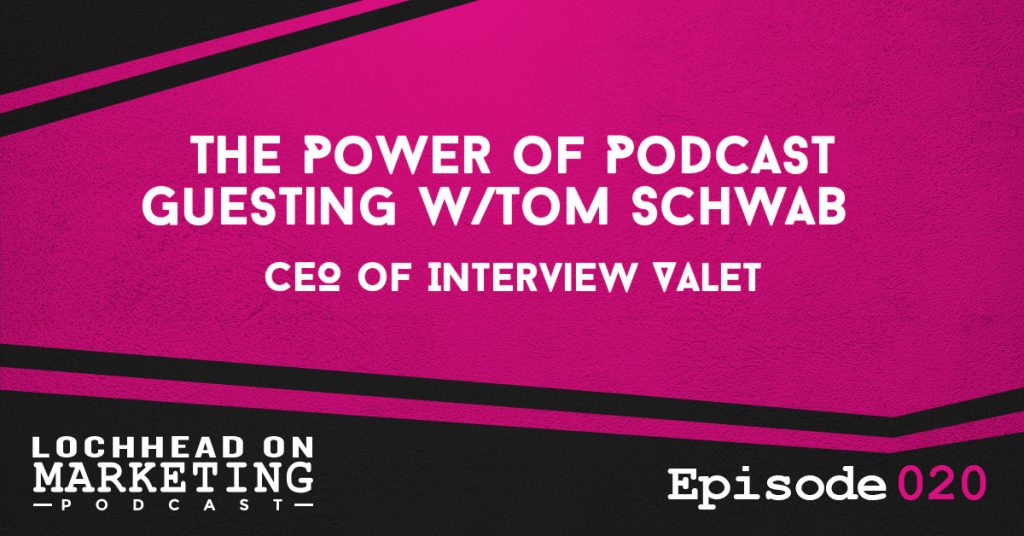
Podcast (lochheadonmarketing): Play in new window | Download (Duration: 46:36 — 42.8MB) | Embed
Subscribe: Apple Podcasts | Spotify | RSS | More
From time to time, we will bring on guests to go deep on a topic in a particular field. Today’s guest is Tom Schwab, founder of Interview Valet. As we celebrate International Podcast Day, we will discuss the power of podcast guesting and why it is a strategic component of legendary marketing today.
Connecting with People
Tom stresses the importance of podcast guesting, especially for business executives, authors, and entrepreneurs. He believes exposure brings opportunity and podcast guesting is one of the most intimate and targeted ways for customers to know somebody.
“I love podcasts because its a way to really connect with people. You’re not yelling, you’re talking with them. They’re choosing to listen to you.” – Tom Schwab
Mainstream Media vs. Podcasting
Tom discusses how powerful podcasting. He says it should be a major part of one’s content strategy. In mainstream media, aside from the cost to advertise (television, print, and radio), one acquires a limited time and limited space, unlike in podcast guesting, where it reaches hundreds of thousands, overtime.
“You’re tapping into an audience, getting that like and trust, getting introduced by someone, they already know. The other thing too is, if you do a live speech, it’s really hard to repurpose that content. If you do a podcast interview, you can do the transcript to make blogs.” – Tom Schwab
Christopher agrees with Tom, as he speaks based on experience. He mentions how he appears on different mainstream media and only get to share a portion of his thoughts for a few seconds.
“Podcast interview is an easy and scalable way to really go deeper. People will understand you and what really drove you, why you got into the business. People should know they could like and trust you. That’s really hard to do in a 30 sec clip or a little Facebook ad.” – Tom Schwab
The Golden Age of Podcasting
Tom cites Harvard University and the conference that they organized last year on podcasting. They call this time as the Golden Age of Podcasting and there is never the best time to explore podcast advertising other than at the present time.
Christopher also shares that there is a lot of whitespace opportunity in podcasting. He believes that there is a high value for sponsors because podcasts provide a high level of intimacy in terms of getting to know the guests through a conversation.
“I think today, brands want to know the heart behind it. Those people that can get out there early and explain that, not in an ad but in an actual conversation. To me, that’s where you can really build up a lifetime value of a customer.” – Tom Schwab
To hear more about the power of podcast guesting and more relevant information from Tom Schwab, download and listen to the episode.
Bio:
Tom Schwab knows how to build an online business.
He’s done it successfully several times and now helps others find online success with podcast interview marketing.
Marketing at its heart is starting a conversation with someone who could be an ideal customer.
Tom helps thought leaders (coaches, authors, speakers, consultants, emerging brands) get featured on leading podcasts their ideal prospects are already listening to. The Interview Valet system then helps them to turn listeners into customers.
The author of Podcast Guest Profits: Grow Your Business with a Targeted Interview Strategy, Tom is also Founder/CEO of Interview Valet, the category king of Podcast Interview Marketing.
Links:
We hope you enjoyed this episode of Lochhead on Marketing™! Christopher loves hearing from his listeners. Feel free to email him, connect on Facebook, Twitter, Instagram and subscribe on iTunes! You may also subscribe to his newsletter, The Difference, for some amazing content.
107 How FanDuel Became a Category King & The Future of Podcasting w/ Nigel Eccles
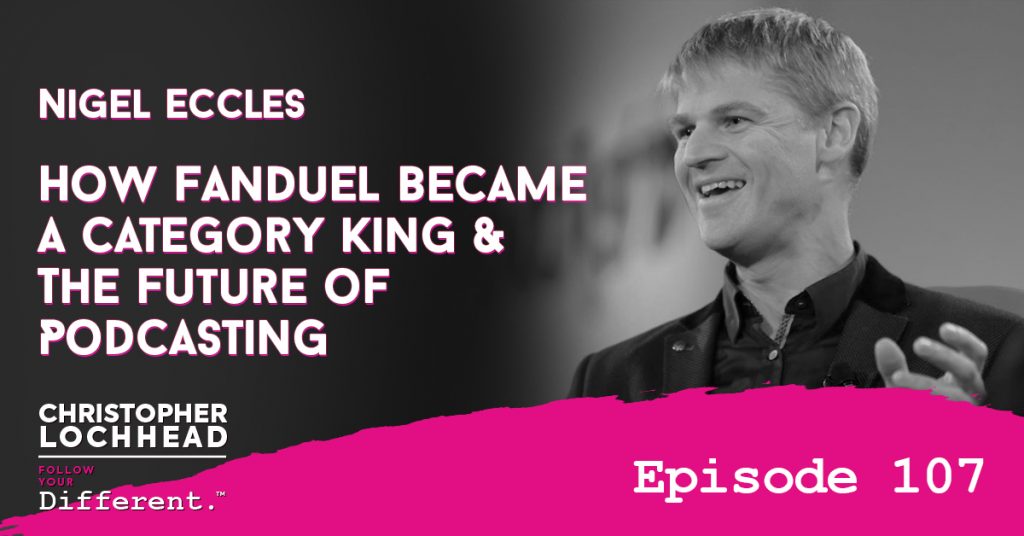
Podcast: Play in new window | Download (Duration: 1:31:48 — 84.3MB) | Embed
Subscribe: Apple Podcasts | Spotify | Pandora | RSS | More
Our guest is the legendary entrepreneur Nigel Eccles. He’s the founder of Fan Duel, the category king in Daily fantasy sports. We go deep on how Fan Duel created and ultimately dominated this mega category.
We also talk about how they created a super-engaged community and how they explored podcast advertising to promote the brand. Nigel explains why he thinks podcasting is a massive new opportunity. In fact, it is one of his motivations why he started his new company, Flick.
FanDuel Fantasy Sports
Forbes reports that daily Fantasy Games is growing at 41% annually, and will be $14.4 billion category in 2020. This brought together five lads from Edinburg Scotland to join this trend. They created FanDuel back in 2009 as they wanted to create a simple platform for fantasy sports enthusiasts.
“We wanted to build something that is so simple and even we can play and I think actually is a big part of the success of the company.” – Nigel Eccles
Building Communities
Nigel narrated how they started FanDuel 10 years ago. When they started FanDuel, Fantasy Sports was played by 25 million people in North America. Their main motivation was creating a sort of community with the same interests — a platform that would connect individuals, not only with friends but with tens of thousands of people.
“It started to connect people who were players. It started to build a community. People want to do it more and more because they want to show they were the best in the community.” – Nigel Eccles
Nigel shares his tips for entrepreneurs when building a community. He advises to first, think about the direct connection you can have with customers and what mechanism can you use to establish that connection. Secondly, entrepreneurs must think about how these customers can connect with each other.
Podcast Advertising
As FanDuel was starting, Nigel and the other founders realized the user base is not growing. Their CMO planned to execute several advertising campaigns, mostly focusing on radio and podcasting. With a great product and innovative advertising, the business grew largely.
“The great thing about FanDuel is, anybody who listens to sports radio was a sports fan.” – Nigel Eccles
Nigel and his team tried a lot of different formats on radio and podcast advertising. They had endorsements and games, where listeners get to compete with the hosts. Christopher shared a lot of information about podcasting and how huge the opportunity is for advertising.
“Podcasting is an enormous opportunity. It is hugely unmonetized. It is one of the best advertising mediums today because there’s a connection with the host. It’s such a strong endorsement. The best hosts only sell what they believe in.” – Nigel Eccles
To hear more about how FanDuel became a Category King and the future of podcasting, and more relevant information about Nigel, download and listen to the episode.
Bio:
Nigel has vast startup experience and was previously the co-founder and CEO of FanDuel, one of Scotland’s first unicorn companies.
Links:
We hope you enjoyed this episode of Follow Your Different™! Christopher loves hearing from his listeners. Feel free to email him, connect on Facebook, Twitter, Instagram and subscribe on iTunes! Get amazing, different stories on business, marketing, and life. Subscribe to our newsletter The Difference.
104 Enterprise Tech Category Queen Jennifer Tejada
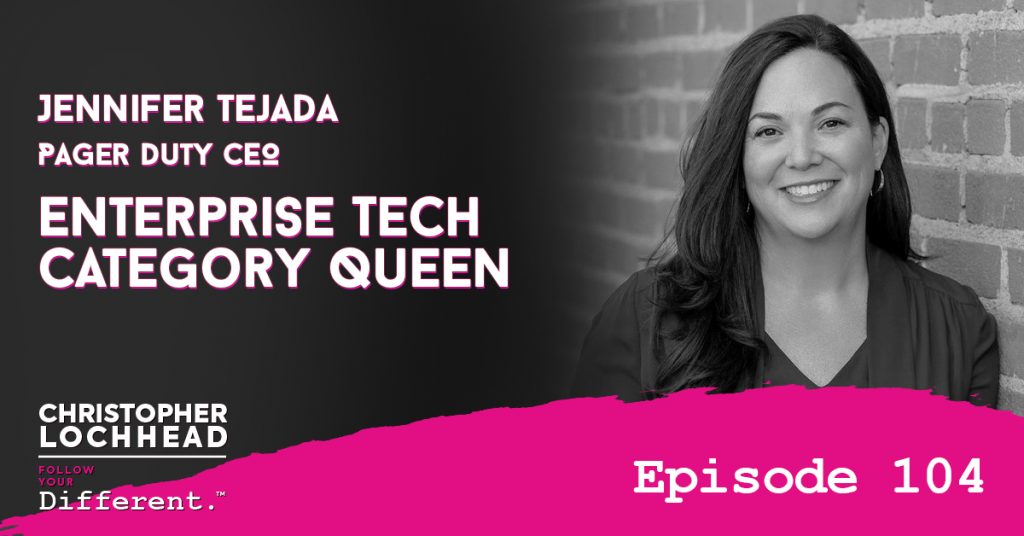
Podcast: Play in new window | Download (Duration: 1:07:00 — 61.5MB) | Embed
Subscribe: Apple Podcasts | Spotify | Pandora | RSS | More
Our guest for today is the CEO of the newly public, enterprise technology company PagerDuty, none other than Jennifer Tejada.
This episode is the second part of the two-part series on IPO. Jennifer shares with us today how it is like to go public. This is a celebration of entrepreneurship and you’ll have fun listening to this long-free-form conversation.
Legendary IPO
Jennifer had a legendary career in Silicon Valley. Various media outlets featured Jennifer due to the recent IPO of PagerDuty, a leading platform for real-time operations.
In a moment of victory, what Christopher calls as “a celebration of entrepreneurship,” Jennifer recounts to Christopher the joys and pains on transitioning from being private to becoming public.
“I enjoyed the process of being forced to refine our story and our value proposition for retail investors and laypeople. I think its really helpful for the business to go through that exercise.” – Jennifer Tejada
NYSE Feels
Jennifer shares that there was not much significant change in terms of their monthly operations. In fact, she perceives the preparation to go public as running two-jobs and she and her CFO vowed to make the most out of it.
“It’s very hard to describe the intrinsic rewards of looking down from the podium of NYSE at a group of people and just seeing this, sort of wonderment in their faces. They just can’t believe, little old us got here, and that is one of the most rewarding moments of my career.” Jennifer Tejada
Jennifer also professed her admiration with her employees who went through this significant milestone with her.
“I don’t think there’s enough of said or honor pay to the folks that bet their careers early on and take pay cuts and take on option risks, to see a company through multiple investment cycle and growth cycles and ups and downs.” – Jennifer Tejada
Extending Reach
Jennifer describes IPO as a big-day-coming-out-party-to-the-world. Further, she mentions that one of the reasons PagerDuty went public is to extend its reach, to tap an enormous market opportunity. She believes being under the radar does not serve that big mission.
“We serve the enterprise market and these enterprises are members of NYSE. They are traded in the NASDAQ. They expect the level of transparency around our performance and how our capitals are being spent and the long term viability of our businesses.” – Jennifer Tejada
Likewise, going public can help create brand awareness and credibility because the company has to go through a lot of processes that will serve public market investors.
“In my view, that rigor, and extra scrutiny is good for business. Hiding away in the private market just for the sake of staying away from that scrutiny is not a good thing because you can’t survive with poor habits for a long period of time.” – Jennifer Tejada
To hear more about the Enterprise Tech Category Queen Jennifer Tejada, download and listen to the episode.
Bio:
Jennifer Tejada is the CEO and Chairperson of PagerDuty (NYSE: PD), a leading platform for real-time operations.
She is a veteran software industry executive and business leader with over 25 years of experience, spanning mass consumer products to disruptive cloud and software solutions.
Jennifer has a successful track record in product innovation, optimizing operations and scaling public and private enterprise technology companies.
PagerDuty went through a strong IPO in April 2019 through her leadership.
Prior to her role at PagerDuty, Jennifer was the CEO of Keynote Systems where she led the company to strong profitable growth before its acquisition by Dynatrace in 2015.
Before Keynote, Jennifer was Executive Vice President and Chief Strategy Officer at the enterprise software company Mincom leading its global strategy up to its acquisition in late 2011 by ABB.
She has also held senior positions at Procter & Gamble and i2 Technologies (acquired by JDA Software).
Jennifer currently serves as a board member of The Estée Lauder Companies Inc. (NYSE: EL) and Puppet, Inc.
Jennifer holds a B.S. from the University of Michigan.
Links:
PagerDuty analysts shower stock with love even after doubling in a month
PagerDuty stock skyrockets nearly 60% on first trading day after IPO
We hope you enjoyed this episode of Follow Your Different™! Christopher loves hearing from his listeners. Feel free to email him, connect on Facebook, Twitter, Instagram and subscribe on iTunes!
103 The Power of an IPO w/ Eric Yuan, Founder of Zoom Communications
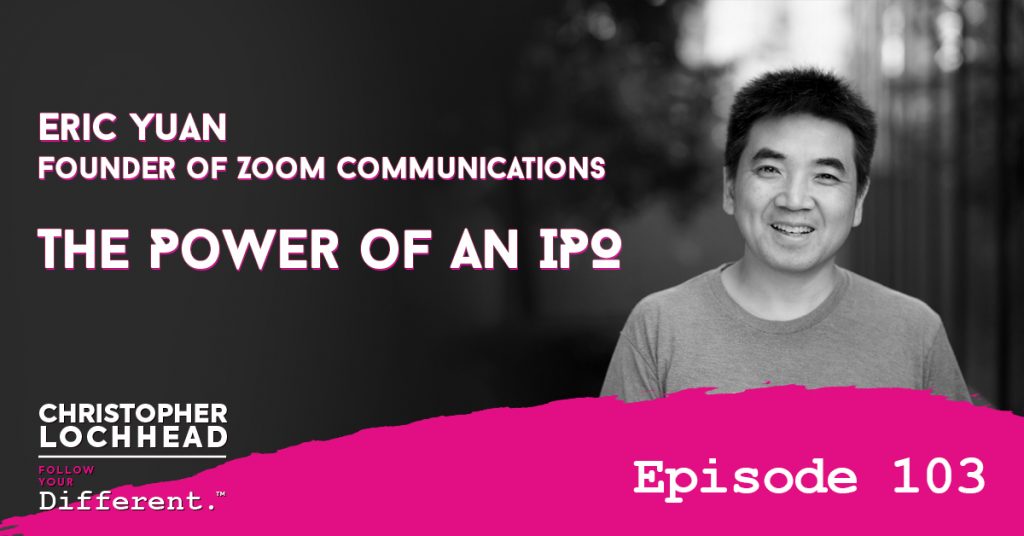
Podcast: Play in new window | Download (Duration: 59:00 — 54.3MB) | Embed
Subscribe: Apple Podcasts | Spotify | Pandora | RSS | More
This is the first in a special two-part series featuring two CEO’s of two recent multi-billion IPOs—Jennifer Tejada, CEO of Pager Duty and billionaire, founder and CEO of Zoom Communications, the amazing Eric Yuan.
Today’s episode features an insightful conversation about how Eric feels like to have a super successful IPO. Eric further shares Zoom’s culture centered on happiness and his motivation, mission and vision for Zoom and much more.
Culture of Happiness
Eric Yuan guested at Christopher’s previous podcast, Legends and Losers Episode 032. As of recording time, Zoom Communications raised $357M in IPO and is a $20+ billion market cap company.
“When I wake up, the first person I ask is myself. Do I feel happy or not? I encourage our employees to ask the same questions. Ultimately, if our employee is not happy, I’m pretty sure they cannot give happiness to our customers. That’s why we keep the happiness culture here.” – Eric Yuan
Christopher cited some amazing data from GlassDoor. Employees rated Zoom 4.8, 5 being the highest. On the question “would you recommend Zoom to a friend, as a great place to work,” 95% said yes. Lastly, on CEO approval, 97% of the respondents said they approve of the way Eric runs the business.
“I think based on that, I should focus on the 3% and plus the 5% why they do not recommend us too. Again, we always like all those feedback to help us become a better company.” – Eric Yuan
Zoom: The Game Changer
Christopher admires how Eric runs his company and how he epitomizes everything great about entrepreneurship, technology, and innovation. He has changed the game in the B2B space in North American and now, internationally. As Christopher says, Zoom has made impossible, possible, such as the ability to work from home and collaborate with the team in different countries.
“I truly feel we just started. We look at our user base and our customer base, compared to the number of knowledge workers worldwide, I think we just started. A huge opportunity ahead of us. How to connect workers worldwide, if you look at the total market, it’s also huge. Look at our revenue, we just started.” – Eric Yuan
Vision and Mission for Zoom
In the next 5 years, Eric candidly shares that he visualizes Zoom to give people a whole new experience in meeting and communicating, even aiming to replace the whole face to face meeting.
“We truly believe data communication is the future, video is the new voice. In the future, no matter where you are, no matter which device you are using, just one click, you can talk with anyone in the world. You can speak on your language and understand with real-time translation.” – Eric Yuan
Christopher also discusses with Eric the amazing marketing strategies that they employ, especially the huge advertisements in major airports in the US.
“They should leverage our technology. Since it’s good for the family and good for society as well. Our goal is to make sure our existing customer is happy. Whenever they travel, [we remind them] you already have Zoom, why do you travel often?” – Eric Yuan
To hear more about The Power of an IPO, and to learn more information about Eric Yuan, Founder of Zoom Communications, download and listen to the episode.
Bio:
Prior to founding Zoom, Eric was corporate vice president of engineering at Cisco, where he was responsible for Cisco’s collaboration software development. Eric was one of the founding engineers and vice president of engineering at Webex. Between 1997 and 2011, he grew his team from 10 engineers to more than 800 worldwide and contributed to revenue growth from $0 to more than $800M.
In 2017, Eric was added to the Business Insider list of the 52 Most Powerful People in Enterprise Tech. In 2018, he was named the #1 CEO of a large US company by Glassdoor and EY Entrepreneur of the Year in Northern California (software category). Eric is a named inventor on 11 issued and 20 pending patents in real-time collaboration.
Eric earned a certification from the Stanford University Executive Program.
Links:
We hope you enjoyed this episode of Follow Your Different™! Christopher loves hearing from his listeners. Feel free to email him, connect on Facebook, Twitter, Instagram and subscribe on iTunes!

